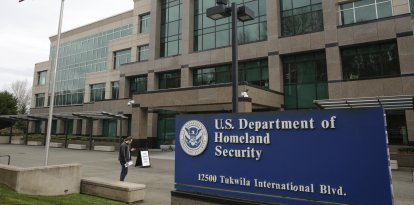Rand Paul calls for repeal of Espionage Act: "It's an affront to the First Amendment"
The Act has served to imprison dissidents, convict Julian Assange and protect the Mar-a-Lago raid.

Wikimedia Commons
The FBI's indictment of Donald Trump is clear: President Trump took boxes of classified documents that he should have turned over to the National Archives and Records Administration before he left the White House, in compliance with the Presidential Records Act.
The search warrant to Mar-a-Lago refers to section 793 on "collecting, transmitting or losing defense information," which was introduced with the Espionage Act. The 1917 Act introduces a set of provisions into Title 18 chapter 37 of the United States Code.
Espionage Act and Donald Trump
FBI has removed dozens of boxes of documents from Donald Trump's residence. The agency later acknowledged that it had taken more than it needed.
Now, the question is whether there was defense-related information among the documents that belonged to the White House and was in Donald Trump's possession. Some media have suggested that he may have had "nuclear documents" in his Florida residence. And the newspaper Wall Street Journal says that the FBI took 11 sets of documents, and that some of them were stamped "top secret."
Rand Paul
Sen. Rand Paul (R-Kentucky) tweeted that the time has come to abolish the law: "The espionage act was abused from the beginning to jail dissenters of WWI. It is long past time to repeal this egregious affront to the 1st Amendment."
World War I
What is the law that allows the impeachment of a president under the name "Espionage Act"? For this we have to go back to 1916. Then, the Democratic candidate, President Woodrow Wilson, won re-election with the slogan "He kept us out of war." Wilson's pacifism was short-lived, because the Zimmerman telegram, in which the German foreign secretary offered a reward to Mexico if it attacked the United States, finally decided the president and part of the public opinion to intervene in the Great War that was being waged in Europe.
The following year, Congress, with the support of President Wilson, passed two laws dangerous to freedom in the country: the Trading with the Enemy Act of 1917 (which Franklin Roosevelt used to keep Americans' gold) and the Espionage Act, also of 1917.
Law of war in peacetime
The Espionage Act is designed for a foreign war situation, and in a context in which part of the public opinion was favorable to the Germans or simply against the country entering a war on another continent. Peace came, but the Espionage Act remained, and has made the United States a police state.
During the War, the Espionage Act was used against citizens who criticized conscription or participation in the war. In fact, it was censorship under the Espionage Law that prompted the Supreme Court to rule for the first time on freedom of expression.
Wikileaks
The various pronouncements of the Supreme Court have been limiting the effectiveness of the Espionage Act, but it came back into the legal and political spotlight with Wikileaks. Although the 1917 Act has never been used to convict a journalist, it is the law that has protected the conviction of Julian Assange for the declassification of documents through the Wikileaks portal.

























